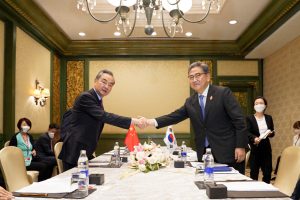China’s Foreign Minister Wang Yi had a full day on July 7. While in Bali, Indonesia for the G-20’s foreign ministers’ meeting, Wang held bilateral talks with his counterparts from Argentina, Australia, Canada, the EU, France, Germany, India, Indonesia, the Netherlands, Russia, Saudi Arabia, Singapore, Spain, and the United States, according to China’s foreign ministry.
Oddly, the ministry did not include South Korea on that extensive list, but Wang in fact did meet with the foreign minister from Seoul, Park Jin, as well. It was the first in-person meeting between the two since Park took up his post under the new Yoon administration in May.
South Korean President Yoon Suk Yeol promised on the campaign trail to be tougher on China and provide unambiguous support for the United States’ regional initiatives, including the Quad. However, since gaining office he has been more circumspect, avoiding calling out China by name even while taking actions – such as attending the 2022 NATO Summit – that are largely read as supporting the United States’ efforts to contain Beijing.
China, for its part, is cautiously watching the Yoon administration’s approach, hoping that it can avoid having a close neighbor turn fully against it. To that end, Beijing avoided criticizing South Korea for its participation at the NATO Summit. By way of contrast, Chinese officials had harsh words for Japan, another East Asian country that attended by special invitation. “It seems Japan intends to spearhead NATO’s foray into the Asia-Pacific… It will only stoke bloc confrontation and create antagonism and division in the region,” said foreign ministry spokesperson Zhao Lijian on July 1.
He declined, despite some follow-up from reporters, to offer a similar criticism of South Korea.
Park continued the Yoon administration’s approach on Thursday, further stretching – while not fully breaking – the limits of ambiguity. In public remarks before his meeting with Wang, the South Korean foreign minister emphasized the Yoon administration’s commitment to “universal values and principles of the global community.” He added that Seoul “will actively participate in the global cooperation and coordination to protect freedom, peace, human rights and the rule of law.” While Park did not elaborate, China has been frequently accused of violating all the principles he mentioned.
That said, both sides also agreed to continue regular communications between their foreign ministers — including a visit by Park to China “as soon as possible” and a visit by Wang to South Korea in the second half of 2022. They also “agreed to work closely together to successfully commemorate the 30th anniversary of diplomatic ties” in August 2022.
For his part, Wang repeated his previous assertions that China and South Korea are “inseparable partners.” He even offered a rhetorical nod to Yoon’s ambitions for South Korea to play a global role, saying both countries “need to make our respective contribution to peace and development not only in our region but globally.” Wang also emphasized the need for China and South Korea to continue their mutually beneficial economic engagement.
Chinese officials have been at pains to highlight the strong economic links between China and South Korea. China remains South Korea’s top export destination and trade partner, accounting for a quarter of all South Korean trade in 2021. Zhao, the Chinese Foreign Ministry spokesperson, speaking at a press conference on July 1, emphasized that bilateral trade reached “a record-high $362.35 billion last year, which is higher than the figure of [South Korea’s] trade with the US, Japan and Europe combined.”
The Yoon administration is keen to wean South Korea off economic dependence on China, and Beijing is just as eager to keep such a decoupling from taking place. In a virtual meeting with Park back in May, Wang urged South Korea and China to “stay committed to win-win cooperation,” saying, “The two sides have achieved common development and prosperity through pragmatic cooperation featuring equality and mutual benefit.”
Decoupling certainly didn’t seem in the cards, as Park and Wang promised to “deepen substantive cooperation in fields such as economy, culture, and environment.” In particular, they promised “to work together for smooth economic cooperation between the two countries,” including negotiations on a follow-up to the China-South Korea free trade agreement that will cover services and investment. Notably, South Korea has now agreed to work with both China and the United States on “resilient supply chains.”
Of course, Park had also stated that he would discuss North Korea issues with Wang during their meeting, although details on that aspect of the conversation were not forthcoming. “I intend to emphasize the importance of China’s role in resolving the North Korean nuclear issue,” Park told reporters before the meeting, according to South Korea’s Yonhap news agency. According to the South Korean Foreign Ministry’s readout, Park “asked the Chinese side to play a constructive role so that North Korea can immediately stop provocations that are aggravating the situation on the Korean Peninsula and the region and return to dialogue.”
The Yoon administration has promised a more robust response to North Korea, and has made good on that by countering Pyongyang’s unprecedented spate of missile tests with Seoul’s own launches and South Korea-U.S. military drills. South Korea is especially eager to prevent North Korea from conducting a seventh nuclear test, as experts say Pyongyang has completed the necessary preparations. China would be a valuable partner in that effort, as it is Pyongyang’s sole ally and remains the North’s top trading partner, even amid a massive lull in trade caused by COVID-19 border restrictions.
Meanwhile, Park will hold a trilateral meeting with his U.S. and Japanese counterparts on Friday. The South Korean minister has repeatedly expressed his interest in resolving the current freeze in Japan-South Korea ties.

































